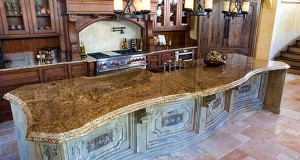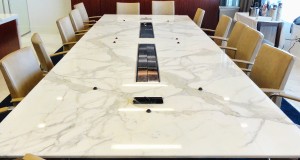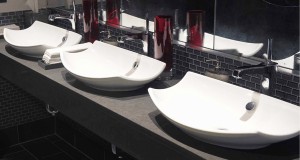Ask Mitch Hires of Atlanta Kitchen in Decatur, Georgia what might be the keys to his company’s success and he will talk about some pretty sound business strategies, such as diversifying product offering, hiring great employees and paying off debt. But, as he is quick to tell you, there’s more to the equation – much more.

“At the end of the day we had a good name in this community and that was all started by my dad. He was honest and fair and people knew that. When things got tough we fell back on that. We couldn’t dishonor his name.”
Turns out, Atlanta Kitchen had a pretty big presence in the Atlanta market going into the recession. Over the years Mitch and his brother, Sonny, had parlayed a stake in their father’s business, Atlanta Marble Manufacturing, into a 10 company network that offered such products as countertops, glass & mirror, fireplace surrounds, garage doors and acrylic tubs.
Their market was primarily residential new construction which, at the turn of the century, was running at a white hot pace and seemed likely to go on forever.
Lessons Learned
“We got a little carried away, in my opinion, with expansion in the 2005-2006 years,” Hires says. “In 2006 our revenues peaked out north of $50 million and we had 400+ employees. Then the downturn hit. By 2010 we were down to around $27 million, with about 210-215 employees. I tell people we learned a lifetime of lessons in that four years.”

“The rest was primarily the remodel business. Through the downturn we made a point to diversify. We had to reinvent ourselves, like everybody else, when it came to remodeling, making sure we were a part of that. Today we are about 55-60% single family residential. We also do a lot of commercial work – multi-family, hospitality, medical, dental, schools, etc.”
And where Atlanta Kitchen was mostly builder-driven pre-2006, the company is now fully engaged in the retail market. “We have four retail design centers here in town that are all selection centers for builders,” he says. “At the same time we’ve got a different price point for retail and remodel work. That has been a win/win for us. Diversification has been the key. It’s about making sure that no one segment of our business becomes too heavily weighted.”
Creating A Consistent Brand
All this diversification presented the Hires brothers and their partners with a new challenge. “We had a branding problem because we had all these different companies,” says Hires.

On the retail side, the company looked for a consumer-friendly moniker consistent with the Construction Resources brand. “We were told that Construction Resources sounds like a builder place – if you are not a builder you can’t go there. So all of our design centers are branded CR Home.”
Today, Construction Resources’ sales have eclipsed the 2006 high-water mark for revenues. It employs about 375 people and has automated many of its operations. The company continues to expand into new markets, including its latest foray into floor coverings. During the recession Construction Resources increased its market area to include four states (Georgia, Florida, Alabama and South Carolina) “as a matter of survival.”
Atlanta Kitchen is also a Cambria Lexus Partner. “It’s a big part of what we are doing, and will continue to be a big part of our future,” Hires explains. “Builders are looking for something different than what you can find in apartments today, which now offer granite as a standard. Plus, there is a whole new group of consumers in their 30-somethings, who came up on the Internet and who are very well educated. They understand that quartz products are very durable and long lasting and Cambria speaks very well to that group.”
All-in-all, the folks at Construction Resources have plenty to keep themselves busy, especially now that the economy is coming back. “It’s all about execution right now,” says Mitch Hires.
Want to know more? At Moraware, we make software for countertop fabricators. CounterGo is countertop drawing, layout, and estimating software. JobTracker is scheduling software that helps you eliminate the time you waste looking for job folders. RemnantSwap is a free place to buy and sell granite remnants with fabricators near you.
